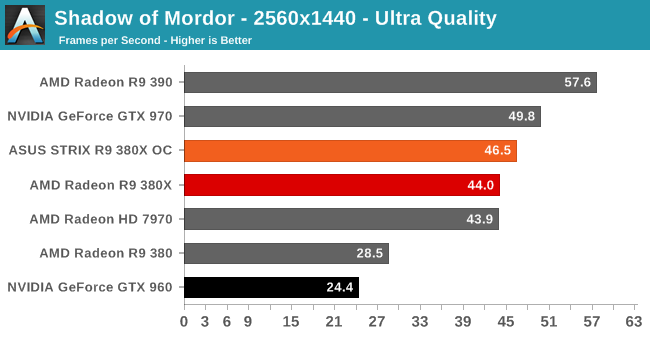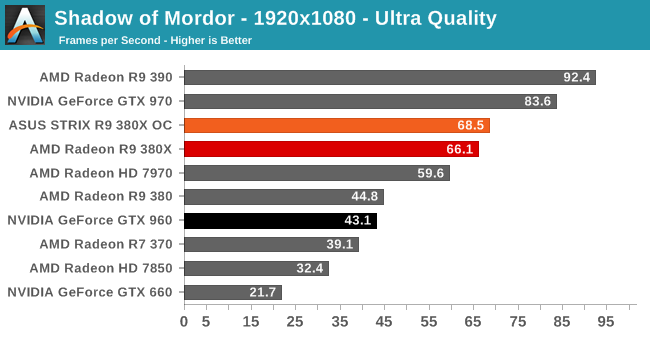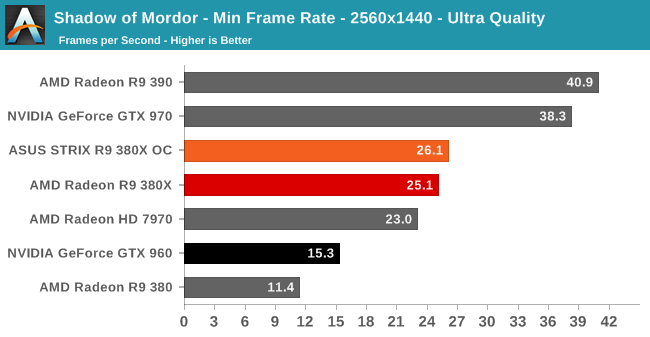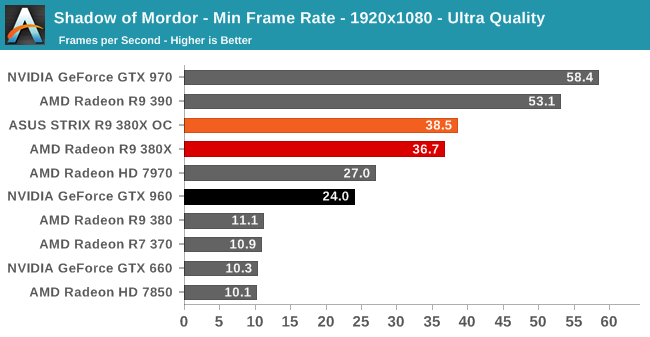The AMD Radeon R9 380X Review, Feat. ASUS STRIX
by Ryan Smith on November 23, 2015 8:30 AM EST- Posted in
- GPUs
- AMD
- Radeon
- Asus
- Radeon 300
Middle Earth: Shadow of Mordor
Our next benchmark is Monolith’s popular open-world action game, Middle Earth: Shadow of Mordor. One of our current-gen console multiplatform titles, Shadow of Mordor is plenty punishing on its own, and at Ultra settings it absolutely devours VRAM, showcasing the knock-on effect that current-gen consoles have on VRAM requirements.


Shadow of Mordor is the first game in our benchmark suite that really hammers memory capacity, which in turn drives a very large wedge between the 4GB R9 380X and the 2GB R9 380 and GTX 960. There’s simply no comparison here; even at 1080p the R9 380X is 50% or more ahead. And situations like this are a big reason that I believe that anything other than a budget card should come with 4GB at this time. Even if one is not buying an R9 380X, they should at least be buying a 4GB R9 380 or GTX 960.
Meanwhile it’s interesting to note that this is the only game that shows a real advantage for the R9 380X over the 7970. It’s possible that we’re looking at the differences in 3GB of memory versus 4GB, but given the results at 1440p versus 1080p, I suspect there’s a bit more going on here. Either way it shows that there will be times where a full Tonga card is a distinct improvement over a full Tahiti card.


Our minimum framerates reiterate what we saw in our averages. Even at 1080p the smaller 2GB cards get hit hard.










101 Comments
View All Comments
funkforce - Monday, November 23, 2015 - link
Haha, funny you should ask that...Check the comments...
January 2015
http://www.anandtech.com/show/8923/nvidia-launches...
http://www.anandtech.com/show/9547/nvidia-launches...
http://www.anandtech.com/comments/9390/the-amd-rad...
"jeffrey - Thursday, July 02, 2015 - link
Ryan Smith, any update on GTX 960
REPLY
Ryan Smith - Thursday, July 02, 2015 - link
As soon as Fury is out of the way. "
http://www.anandtech.com/comments/9621/the-amd-rad...
extide - Monday, November 23, 2015 - link
Looks like you missed a comment, because there was one at one point that said that there will not be a 960 review. I don't have a direct link to it because I'm not obsessed with the topic, but yeah, it was said.funkforce - Monday, November 23, 2015 - link
You're right, I don't know when that was said. I waited months for that review, because I trust the unbiased reviews here and wanted to buy a new graphics card based on info I could count on.And I just really don't like when you keep promising things, stringing your readers on, and then never delivering. I don't care if the review gets posted, it's just how it was handled. I've been raised that a person's word means something (he told me personally on twitter that he would do it). And I'm sure you could go on that this is the internet etc. but when you've been reading a site since it's start, it's content means something, at least to me. I guess it's why we're all here to some extent. If you go back on your word, then you should at least let ppl. know, a bit more officially, than in a comment section of, I would assume, another article.
Samus - Monday, November 23, 2015 - link
The problem with reviewing the GTX960 is the drivers have been optimizing around improving its performance all year, and every single card performs so different. The GTX960 overclocks incredibly well, some people hit 1400MHz is the board has the right power configuration. This is why you hear people talk about the GTX960 completely trumping the R9 28x/38x's when in reality, both GPU's give and take blows in various games at stock.But when overclocked, the GTX960 is a bit faster than an overclocked R9 28x/38x. I think this causes a lot of reviewers to tip-toe around these cards. And when you consider a GTX960 with 4GB is over $200 and a GTX970 with 4GB (er technically 3.5GB) is $260-$280 after rebate, it becomes muddled.
OrphanageExplosion - Tuesday, November 24, 2015 - link
I own the GTX 960. Mine hits 1450MHz easily. I think they all do because temps and power consumption barely budge. I also own the R9 380 in 4GB configuration.Drivers have barely improved the 960 performance and the 380 is faster in almost every game I own. Overclocking gets the 960 to parity, or slightly better to a small extent where you can't really tell the difference.
Of the two I'd take the 960 simply due to the efficiency, but driver updates have really made no difference to anything other than the games they were optimised for. Library titles have seen no improvement.
dananski - Monday, November 23, 2015 - link
I also waited a while, checking the site often. I think I spotted some 960 benchmarks slipped into some analysis article on here many months later, but no post to say they'd been done, let alone a full review.It's not just the graphics section either. I really don't get why there are so many announcements and so few reviews on here these days. It's a shame because reviews like this one here are the reason I like AnandTech so much.
olivaw - Monday, November 23, 2015 - link
I wanted the GTX 960 reviewed because it seems to be pretty good for an HTPC, since the power consumption is lower than most chips. I know the card is good, but I wanted an AnandTech review :)drwhoglius - Monday, November 23, 2015 - link
From Steam Hardware Survey http://store.steampowered.com/hwsurvey/directx/October 2015 results
GTX 970 3.80%
GTX 960 2.16%
R9 200 Series 1.06%
R9 300 Series not yet measurable (or too new to be measured as GTX 950 isn't measured either)
Tikcus9666 - Monday, November 23, 2015 - link
Power difference is irrelevant in desktop PC's a 75W difference... 20 hours of usage at Full load is ~20p in the UKa 1000 hours of gaming (a years worth?) for an extra £10
This does not factor in some of this usage is in Winter months, so the extra heat generated reduces the amount of heat required from other sources, thus reducing other heating costs
jasonelmore - Monday, November 23, 2015 - link
what about idle power consumption? which uses 24/7 365 days.it can add up